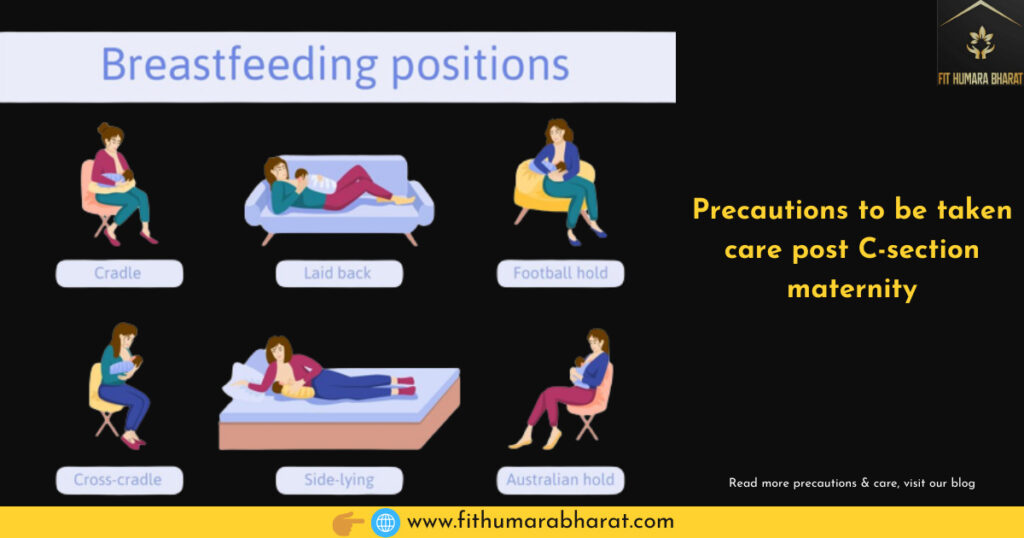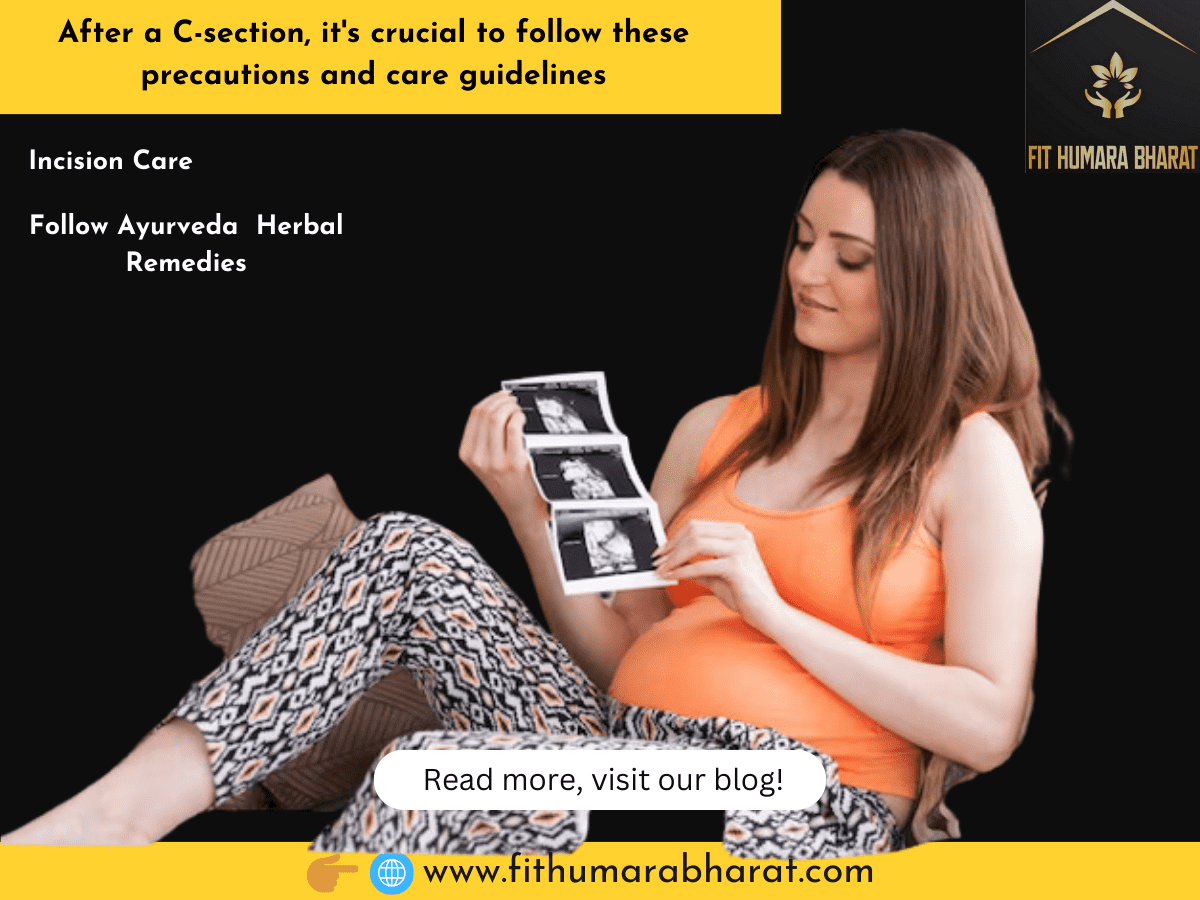Childbirth is a transformative experience for women, whether through natural delivery or Caesarean section (C-section). After a C-section, post-maternity care is crucial for a smooth recovery.
This article explores holistic approaches, including natural medicine, Ayurveda, and naturopathy, in addition to conventional medical care.

After a C-Section – Precautions and Care
| 1. Pain Management |
| Conventional Care: Pain management is crucial post-C-section. Healthcare providers prescribe medications, which should be taken as directed. |
| Natural Medicine: Herbal remedies, such as arnica or chamomile, might help alleviate pain. Consult a healthcare provider before using any natural remedies. |
| 2. Rest and Sleep |
| Conventional Care: Adequate rest is essential. Avoid strenuous activities and heavy lifting. |
| Natural Medicine: Herbal teas like valerian or chamomile can promote relaxation and improve sleep quality. |
| 3. Incision Care |
| Conventional Care: Keep the incision area clean and dry to prevent infection. |
| Natural Medicine: Aloe vera gel or calendula ointment can soothe the incision area and promote healing. |
| 4. Nutrition |
| Conventional Care: Consume a balanced diet rich in vitamins, minerals, and protein. |
| Ayurveda: Ayurveda recommends postpartum diets, known as “Sutika Ahara,” including nutrient-rich foods like ghee, grains, and herbs that aid recovery. |
| 5. Hydration |
| Conventional Care: Stay hydrated, especially if breastfeeding. |
| Naturopathy: Naturopathy promotes hydration through herbal infusions and hydrating foods. |
| 6. Breastfeeding |
| Conventional Care: Proper positioning and support for breastfeeding to avoid strain on the incision area. |
| Naturopathy: Naturopathy encourages natural lactation through herbal teas and specific diets. |
| 7. Avoiding Infections |
| Conventional Care: Vigilantly monitor the incision site for signs of infection, such as redness, swelling, or discharge. |
| Natural Medicine: Echinacea or garlic supplements may boost the immune system and help the body fight infections. |
| 8. Emotional Well-being |
| Conventional Care: Post-C-section recovery can be emotionally challenging. Seek support from loved ones or consider counseling. |
| Ayurveda: Ayurveda emphasizes emotional well-being, suggesting practices like yoga and meditation to maintain balance during the postpartum period. |
Natural Medicine and C-Section Recovery
| 1. | Herbal Remedies | Natural Medicine: Ginger, turmeric, and arnica are known for their anti-inflammatory properties, which can alleviate pain and reduce inflammation. |
| 2. | Aromatherapy | Natural Medicine: Essential oils like lavender, chamomile, and eucalyptus are used for relaxation, pain relief, and promoting better sleep |
| 3. | Homeopathy | Natural Medicine: Homeopathic remedies like arnica can address specific symptoms, such as swelling and bruising. |
Ayurveda and Naturopathy in C-Section Recovery
caesarean section (C-section) recovery is a crucial phase in a mother’s life, and the approach to recovery can extend beyond conventional medical care. This article explores how Ayurveda and naturopathy, two holistic healing systems, can provide valuable support in the post-C-section recovery journey.
Ayurveda: A Holistic Approach
Ayurveda, an ancient Indian healing system, offers a holistic approach to post-C-section recovery, emphasizing physical, emotional, and spiritual well-being. The following aspects of Ayurveda play a significant role in enhancing the recovery process:
1. Sutika Paricharya: A Comprehensive Postpartum Care Regimen
In Ayurveda, the postpartum period is referred to as “Sutika.” It is a time when the mother undergoes various physical and emotional changes. Sutika Paricharya is a specialized postpartum care regimen designed to address these changes and promote healing and rejuvenation.
This regimen includes:
- Dietary Recommendations: Ayurveda prescribes specific postpartum diets, known as “Sutika Ahara,” which include nutrient-rich foods like ghee, grains, and herbs. These foods are believed to aid in recovery and provide essential nourishment.
- Herbal Remedies: Ayurvedic herbs are used to support the mother’s overall well-being. Herbs like Shatavari and Ashwagandha are known for their adaptogenic properties, helping the body cope with stress and promoting hormonal balance.
- Abhyanga (Oil Massage): Abhyanga, a gentle oil massage, is an integral part of Sutika Paricharya. It is believed to promote relaxation, improve circulation, and nourish the body. The choice of oils may vary according to the mother’s constitution and specific needs.
2. Herbal Remedies
Ayurveda harnesses the power of nature to promote healing and recovery. Specific herbs are often recommended to address various aspects of post-C-section care:
- Shatavari: Shatavari is a renowned Ayurvedic herb known for its hormone-balancing properties. It is particularly beneficial during lactation, aiding in milk production and nourishing the mother.
- Ashwagandha: This adaptogenic herb helps the body manage stress and promotes overall well-being during the postpartum period.
3. Dosha Balancing
Ayurveda believes in balancing the doshas (Vata, Pitta, and Kapha) to maintain physical and emotional harmony. Customized diet and lifestyle adjustments are made to balance the individual’s constitution and ensure a smooth post-C-section recovery.
Naturopathy: A Holistic and Natural Approach
Naturopathy, a system of alternative medicine, emphasizes the body’s inherent ability to heal itself. It encourages a natural and balanced lifestyle to support post-C-section recovery. Here are key aspects of naturopathy in C-section recovery:
1. Hydrotherapy Techniques
Naturopathy employs hydrotherapy techniques to alleviate pain and reduce inflammation. These techniques include the use of warm compresses and cold packs. Warm compresses can help relax muscles, reduce pain, and promote healing, while cold packs can reduce inflammation and provide relief.
2. Nutrition for Healing
Naturopathic practitioners emphasize the importance of a balanced diet during post-C-section recovery. It includes foods with anti-inflammatory properties, such as omega-3 fatty acids and antioxidants. These nutrients help the body repair tissues and reduce inflammation, aiding in a quicker recovery.
3. Mind-Body Techniques
Emotional well-being is a crucial aspect of recovery. Naturopathy incorporates mind-body techniques such as:
- Yoga: Gentle yoga exercises can promote flexibility, reduce stress, and enhance overall well-being.
- Meditation: Meditation techniques help mothers stay calm, reduce anxiety, and promote emotional balance.
- Relaxation Exercises: Relaxation techniques can be beneficial for post-C-section recovery. Deep breathing exercises and progressive muscle relaxation can alleviate stress and tension.
Holistic Healing for Post-C-Section Recovery
Combining the wisdom of Ayurveda and naturopathy with conventional medical care can provide a holistic approach to post-C-section recovery. It not only addresses physical healing but also considers emotional and spiritual well-being, ensuring a balanced and comprehensive recovery process.
Consulting healthcare providers trained in these complementary practices is essential to ensure a safe and effective recovery journey. By embracing traditional healing systems in conjunction with modern care, women can experience a well-rounded approach to post-C-section recovery, promoting their physical and emotional well-being throughout this transformative phase of their lives.
Thank You
- POSTNATAL CARE OF THE MOTHER AND NEWBORN
- Surgical site infections after cesarean delivery: epidemiology, prevention and treatment
- Major Concerns of Women After Cesarean Delivery
- Management of pregnancy after cesarean section
- Pregnancy outcomes of women with previous caesarean sections: Secondary analysis of World Health Organization Multicountry Survey on Maternal and Newborn Health




 Sources
Sources